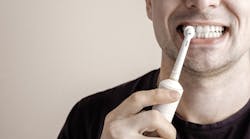Going to the dentist does not rank among many people's favorite things to do. However, regular appointments with your hygienist are critical to your oral health. If going to the dentist is not your favorite, here are a few tips to maybe go a less often and have easier visits.
1. Brush at least twice a day
No shocker there, right? But I don’t mean smother the toothbrush with paste and do a quick scrub to freshen your breath—I’m talking a good two-minute brush, preferably with an electric toothbrush. Technology with power brushes has come a long way. There are super fancy ones with Bluetooth technology that connects to your phone and tells you where you missed. I like the ones that light up with different colors if you brush too hard or don’t brush hard enough. But the one feature I’d say is a must-have in an electric brush is a quadrant timer. Every 30 seconds, the brush will indicate that it’s time to move on to a new quadrant and keep you brushing for two minutes. If an electric brush isn’t an option, choose a soft-bristled brush with a compact head to get it all around your mouth. And use a gentle back and forth or circular overlapping motion. Pro tip: most patients miss the canine and tooth behind it on their dominant side because that’s where they switch directions. So make sure to overlap there!
More "Dear Patients":
How to know you can trust your dentist
Your dental insurance company doesn't care about you
2. Clean in between your teeth
Note that I didn’t say floss. Not that I’m saying don’t floss—but there are other ways to disrupt the gunk between your teeth if flossing isn’t your jam. I use a combination of floss some days, interdental picks while sitting at my desk or watching TV, and a water flosser to clean in between my teeth once in a while. Amazingly, all three techniques seem to get out something different.
3. Don’t neglect your tongue
Your poor little tongue takes a beating. We burn it, we bite it, and it is often ignored when it comes to home care. All those little papillae on your tongue hold onto bacteria that can affect your mouth's health. Get a tongue scraper and scrape your tongue once a day. You’ll find you have fresher breath too!
4. Watch your diet
We’ve all heard about sugar bugs and how they cause cavities. And while that’s true, it’s way more complex than that. Any time you eat and drink (anything but plain water), the pH in your mouth drops. Think of the yummy coffee drink you savor for a few hours each morning. With every sip, the pH goes down. Depending on what you’re consuming and your oral health, that pH could remain low for a long time—putting you at risk for cavities and gum disease. Pay attention not only to what you’re eating—sugars, carbohydrates, and acidic foods—but also to how often.
5. Get a physical
The health of your overall body directly affects the health of your mouth. If you have uncontrolled diabetes, for example, you’re at a much higher risk for gum disease. Acid reflux due to gut health issues ends up right in your mouth, dropping that pH and potentially damaging your teeth. There are even connections to mental health and oral health. If you are someone who builds up a lot of tartar, studies are showing you might be low on Vitamin D. Taking care of your body is taking care of your mouth and vice versa.
6. Breathe through your nose
This one does not make sense at first. As a dental professional, it took me a long time to understand this. Our bodies want us to breathe through our noses. But habits, diet, environment, and more have made many of us mouth breathers. When we breathe through our mouths, we dry out the oral tissues causing inflammation and bacterial growth. There are exercises you can do to help you retrain your breath. Or, if the problem is more complex than that, there are myofunctional therapists who can help you with your nasal breathing.
None of these suggestions is a get-out-of-jail-free card. But following it can help you maintain your oral health between visits. And when you are doing your work at home, you are healthier, your visits will get easier, and maybe, just maybe, you can go a little bit longer between visits. But that’s up to your hygienist!






